A new answer to an old question: 'Do natural disasters disprove God?'

Natural disasters don't point to an unloving God, but their effects are a sign of injustice perpetuated by humanity, a leading professor of geophysics has said.
In an interview published in the Melbourne Anglican, Professor Bob White of the University of Cambridge said using the term "natural evil" to describe disasters such as tsunamis, earthquakes and volcanic eruptions is an unhelpful one, because "even though they can cause terrible devastation and loss of life they are also essential for life".
"Floods bring nutrient-rich soils down into the flood plains, where we grow crops. Earthquakes enable mountains to grow, and then the mountains get eroded and bring those same soils down the rivers. Volcanoes are the main source of nutrients from the deep earth, bringing them up onto the surface of the earth. They're all parts of what make this world a very fertile place for humans to live on. If it weren't for those we wouldn't be here," White explained.
He added that given the earth's estimated age is over 4,500 million years old, there were earthquakes and floods long before humanity first rebelled against God. They can't, therefore, have come in with the fall as many Christians believe. But their disastrous effects are made worse by injustice, compounded by a broken humanity, White said.
"Time and time again you can see some natural process, like a volcanic eruption or an earthquake or flood, turned into a disaster by the actions of humans. Now, that doesn't account for every single death but it can account for the huge majority."
The 2010 earthquake in Haiti was so catastrophic largely due to its poor infrastructure and its poverty – an earthquake in California in 1989 measured the same on the Richter scale but killed just 57 people, in comparison to 230,000.
"So you have to say, 'Whose fault is it they died?' It wasn't their individual fault, but it was human factors that led to them living in such circumstances. And time after time the people who die in disasters are the poor and the disadvantaged or the infirm," White said.
"That really does seem unjust, doesn't it? And you can see the pattern repeated in disaster after disaster: there is human agency at work at some level which turns what is of itself a good process into a disaster."
White is also the director of the Faraday Institute for Science and Religion, based at Cambridge University. It aims to engage scientists with the suggestion that it is "reasonable to hold religious faith and it helps explain the world a lot better than just science on its own," but those involved also speak at church events and Christian Unions. They are currently trying to reach ordinands, with the hope that they will be able to close the gap between faith and science within the Church.
"Although science and Christian faith have never presented any major intellectual conflict for me, it is clear that in our culture there is an often unspoken assumption that they are in fact opposed to each another," White said.
"Sometimes Christians contribute to this distrust of science and retreat into statements that the Bible as interpreted literally is the only truth. The implication is that the science must be wrong."
The debate around evolution is an obvious example of this, but White believes that it is possible to accept both the evolutionary process and the existence of God. "The evolutionary story is one of the most powerful descriptors of the inter-relationships between organic life, so I have no reason to doubt it. But the question is, what changed us from being animals to being humans made in the image of God?" he explained.
"I think that issue of being in the image of God is the key issue, because that's what the Bible says is the difference between us and animals; nothing else is made in the image of God. The way I square that is that at some point God breathed awareness of himself into some hominids and turned them into humans made in the image of God."
Turning his attention to new atheism, White said that it is actually helping the science vs religion debate by bringing it into the public consciousness. "But it is a bit sad to see people like Richard Dawkins railing against his version of Christianity; they're railing against a straw man that is not the Christianity that I believe in," he added.
"It's interesting, isn't it, that the new atheists like Richard Dawkins and so on, are so violently opposed to something they say they don't believe in. Why are they so worried about religion if they think it's meaningless? And yet they clearly are. I think they suspect there's something to it, after all."











